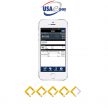
In B2B Transactions We Trust. But First, Verify!
The shift towards ecommerce as a preferred buying platform means B2B businesses have also had to catch up, and this has led to a significant change in the way many B2B transactions are conducted.
With ecommerce, B2B companies can set up a website and sell direct to clients online, while dedicated marketplaces and auction sides also provide B2B businesses with a viable online platform.
Ecommerce has also made it easier to reach out to emerging markets; all of this means that the B2B sector is thriving online and the success is reflected in the predicted value of B2B commerce.
Worldwide, B2B ecommerce is projected to be worth $6.7 trillion and $1.1 trillion in the United States by 2020. This expected surge in sales is obviously positive news for those in the B2B sales sector, however, it doesn’t come without its problems, especially when dealing with customers from further afield.
Verifying the person’s true identity has become a common issue, and fraud is a known problem in B2B transactions, which is why companies are being urged to verify the credentials of an individual first before beginning to trust them.
Why the Need for Verification?
B2B sales often require building long term relationships, and with B2B sales often involving large transactions, trust has to be at the heart of these relationships.
Both parties are taking a degree of risk when they start a new business relationship so some level of trust is imperative; demonstrating expertise, transparency, working towards common goals and always keeping the best interests of the client at the center of the relationship are just some of the factors that contribute to trust over time.
However, in a recent article, it is advised that before you can start building trust, it’s imperative that verification should come first.
The main issue is, B2B businesses are increasingly selling to a must wider audience. Because of this, it can be difficult to know who you are selling to or buying from, and whether the other party can be trusted or if they are who they claim be.
This had led to an increased need to find more effective ways of completing verification checks, and it has given rise to a new breed of ‘identity as a service’ businesses.
Identification as a Service Business
IDaaS comes in various forms, but often includes biometrics to help authentic a person’s ID and confirm their identity; apart from the added security this offers, these additional verification tools can bolster trust on both sides.
These types of services are increasingly being used by businesses; the B2B sector is starting to realize the value of them, and not just in terms of verification.
Creating a positive customer experience is also crucial to long term retention of clients, and this is an area where some B2B companies fall behind. Part of the problem that contributes to a poorer customer experience can be a lack of real-time responsiveness. However, many of these new identification services can work in real-time, reducing the chance of delays and resulting in a better customer experience for the customer overall.
One area where IDaaS is being used is the dedicated auction and B2B platforms. These companies usually have their own measures in place to reduce the risk of fraud, but that doesn’t mean they don’t need some outside help, which is where IDaaS businesses come in.
For instance, one notable example of these services being used in the B2B sector is the B2B auction platform Saltrex. The company recently started using Jumio, a firm that specializes in digital verification, to make their sales environment even more secure.
Jumio has several ID Verification products available, and their Netverify offering allows ID and document verification. The software works by letting customers scan in a government ID with a smart device. A comprehensive ID check can then be conducted to confirm the buyer as authentic or to reject them if the ID cannot be confirmed.
There are numerous other identity verification services available now, such as Truliloo, Miicard and Direct ID, however, its Jumio that has been dominating the sector, with 49 percent growth in 2016, and more businesses are becoming customers.
Such services are of value to many business sectors, but as Jumio’s CRO Robert Prigge, told PYMNTS.com, they are extremely relevant to the B2B businesses due the value of goods and payments at stake.
The firm also use a separate biometric facial recognition program so the seller can confirm exactly who they are trading with; this added dimension allows users to provide a selfie along with a photo ID to further confirm their identity, and these additional identification measures can also ensure companies are following industry directives, such as Know Your Customer (KYC).
“Know Your Customer” Regulations
Aside from improving security, improved customer experience and trust, the use of various verification tools are an important part of assisting B2B companies in complying with the KYC and Anti-Money Laundering regulations.
KYC regulations are in place in various countries around the world, including the United States, the United Kingdom, Italy, and Australia. These regulations put the onus on the business to check the identity of the party they will be trading with to lower the risk of money laundering taking place.
Initially, this measure was primarily used by banks, but now it is utilized across many sectors; it’s often considered a vital part of risk assessment before taking part in a transaction, especially when large amounts of cash are involved.
If you are familiar with them, you’ll know there are several stages to the KYC regulations, including confirming the identity of the your customer, a customer identification program, and basic and enhanced due diligence.
However, keeping up with these regulations is complex, time consuming and costly, with some companies spending up to $500 million just to make sure they comply with the directives.
In addition, some financial institutes have raised concerns that they don’t have enough staff who have the right skills in KYC compliance, and it has also been noted that the KYC regulations are having a negative impact on businesses relationships with customers.
Research from Thomson Reuters indicates that 89 percent of customers said they had a poor KYC experience, and 13 percent of corporate customers “had changed their financial institution relationship as a result.”
However, although the need for compliance does put an additional strain on businesses, the cost of not complying can be even more expensive, with financial institutions paying out billions in fines for their failure to comply since 2013.
The problems inherit in keeping up with these regulations – and the regular changes to them – makes it easy to understand why IDaaS services are becoming more of a feature as the need for verification increases.
B2B Transactions & Levels of Fraud
Most of the time, B2B transactions will go smoothly, and many B2B firms will be working with regular clients that they already know they can trust. However, if you’re thinking that verification isn’t truly necessary for your B2B transactions, then there are some statistics that might make you think again.
Back in 2014, one survey, which was carried out by B2B marketplace Kitmodo, found that nearly 20 percent of online fraud enquiries received by B2B merchants were attempted fraud, and payment fraud made up most attempted fraud cases. And at a cost of an average of $40,032, the loss due to fraud is significant to the businesses that caught out.
As Kitmodo’s CEO Richard Baker, explains:
“The inquiry may seem genuine, with the purchaser possibly asking all the right questions.”
“But then they try to buy fraudulently — such as asking the merchant to send the product prior to payment or engaging in check fraud or credit card fraud.”
And a further survey, this time from the Association of Financial Professionals (AFP) and JP Morgan, which was published in 2015, also detailed how check payments were putting B2B businesses at risk.
Even now, transaction fraud continues to be an issue for B2B companies. One of the factors is the continued use of checks in B2B sales, which remains the preferred payment option for some B2B companies, despite the fact that research indicates checks are more likely to be subject to fraud. However, the problem isn’t just limited to checks: wire transfers and company credit/debit card fraud is a common issue too.
Nevertheless, another factor that contributes to the problem is compromised business emails, which has led to a staggering increase in B2B fraud, according to the latest statistics from the FBI, but there are ways to reduce the risk. For instance, AvidXchange is just one company that stresses the importance of introducing payment automation tools and using vendor verification to curb this growing problem.
Further, as an article published by American Express points out, B2B firms have a tendency to use wire transfers, which can also put B2B businesses at risk due to the fraud risks associated with this type of payment method.
However, the risk of fraud is not just an issue for B2B companies. Fraud in general is growing in the United States and it’s now at record levels, according to the latest figures from Javelin’s research.
Their 2017 Identity Fraud study found that 6.15 percent of shoppers in the U.S fell victim to I.D. fraud, and as predicted, there has been a significant rise in card not present fraud as measures like EMV make card present fraud more difficult. In addition, new account fraud remains a problem, according to the research.
B2B Global Commerce & Verification
As well as the growing scale of B2B transactions, a further element that puts B2B merchants at risk is an increasingly global marketplace; being able to trade online has inevitably led to a growth in transactions from developing countries and other faraway locations, which can make proving the ID of the buyer even more difficult.
Some countries are also more prone to fraud than others. Indonesia, Venezuela and Brazil have been named among the top five countries for ecommerce fraud, according to a LexisNexis study, and Nigeria and Algeria are also associated with high levels of fraud. This in way means that these countries should be avoided completely, but this is where further verification can be prove crucial.
Further, some of the methods used to verify a person’s identity aren’t always considered adequate. For instance, in some industries, like conveyancing, one method being used by Australian businesses was to ask the overseas buyer to participate in a Skype call and to pose with their passport because the businesses couldn’t see another way of confirming a person’s ID. However, there are concerns that measures like these aren’t enough to prevent fraud, which is why there have been calls for more ‘stringent verification policies’ to be put into place.
However, B2B companies have a much wider choice of payment options now, with many payment processing specialists catering for international B2B transactions, and more B2B firms are choosing to move to electronic payments, or at least exploring the option.
Conclusion
With more B2B companies switching to an online platform and depending on ecommerce for business, and with increased trade from cross-border clients, verification has never been more important in the B2B sector.
Numerous reports highlight fraud as a concern for B2B businesses, with many commercial enterprises falling victim to fraudulent activity, nevertheless, that doesn’t mean B2B payments can’t be trusted, but it does mean further verification checks are fast becoming an essential part of safely doing business.
Fortunately, there has also been many numerous advances in the verification process that offer a more sophisticated approach and they can help reassure the business owner that the buyer is who they claim to be,
For instance, verification as a service businesses are becoming increasingly common, and biometrics are often used for additional peace of mind.
In addition, as more businesses choose to use electronic payments, their reliance on checks will reduce, which further limits the chances of fraud, and working with a payments processing company that facilities overseas transactions can also help limit fraudulent payments as they will have checks in place.
Ready to get started?
Get in touch or create an account





